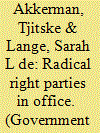| Srl | Item |
| 1 |
ID:
178278


|
|
|
|
|
| Summary/Abstract |
Since the early 2000s, Japan has witnessed the growing salience of so-called netto uyoku (online right-wingers). This group is characterized by strong anti-China and anti-Korea sentiments, nationalistic political views, and online political engagement. While online radical right movements in Europe are often regarded as support bases for radical right candidates or parties, few studies have investigated whether this assumption applies to Japanese online right-wingers. The present study sought to shed light on this issue by conducting a large-scale web survey with 77,084 respondents living in the greater Tokyo metropolitan area. Respondents were registered monitors for a research company. The large sample size enabled multivariate analyses to clarify the characteristics of online right-wingers in comparison to other respondents. The results indicated that 1.5 percent of the respondents (1,167) could be classified as online right-wingers and, in contrast with the political discontent hypothesis, most online right-wingers had a high degree of external political efficacy and lower levels of populist attitudes relative to other respondents. This suggests that online right-wingers trusted and remained satisfied with the current political conditions. Furthermore, they were more likely to vote, especially for established conservative parties, suggesting an affinity among online right-wingers for traditional conservative parties and candidates. These findings indicate that, unlike in Europe, Japanese online right-wingers are not a support base for radical right candidates and parties. In Japan, which is under a right-leaning government, online right-wingers have not become a driving force for emergent radical right parties.
|
|
|
|
|
|
|
|
|
|
|
|
|
|
|
|
| 2 |
ID:
115028


|
|
|
|
|
| Publication |
2012.
|
| Summary/Abstract |
Radical right parties are becoming increasingly likely candidates to participate in government coalitions in Western Europe. Comparative research on the electoral performance of these parties in government is still scarce. Our overview of the electoral effects of government participation of six parties in national governments shows that they do not run a higher risk of losing votes after government participation than other parties. There is considerable variation, however. Some radical right parties experienced great losses, while others won additional support. Focusing on the ways in which radical right parties conducted themselves in government, we explore why some parties won votes and others lost in post-incumbency elections. We compare their policy achievements with regard to immigration and integration policies, the performance of their ministers, and the party coherence of the six parties in office. Our analysis shows that policy records do not fully explain the variation in post-incumbency electoral results. Weak performance and internal party conflict prevent parties from credibly laying claim to the policy achievements of coalition governments and demonstrate that some of these parties were not ready for office.
|
|
|
|
|
|
|
|
|
|
|
|
|
|
|
|